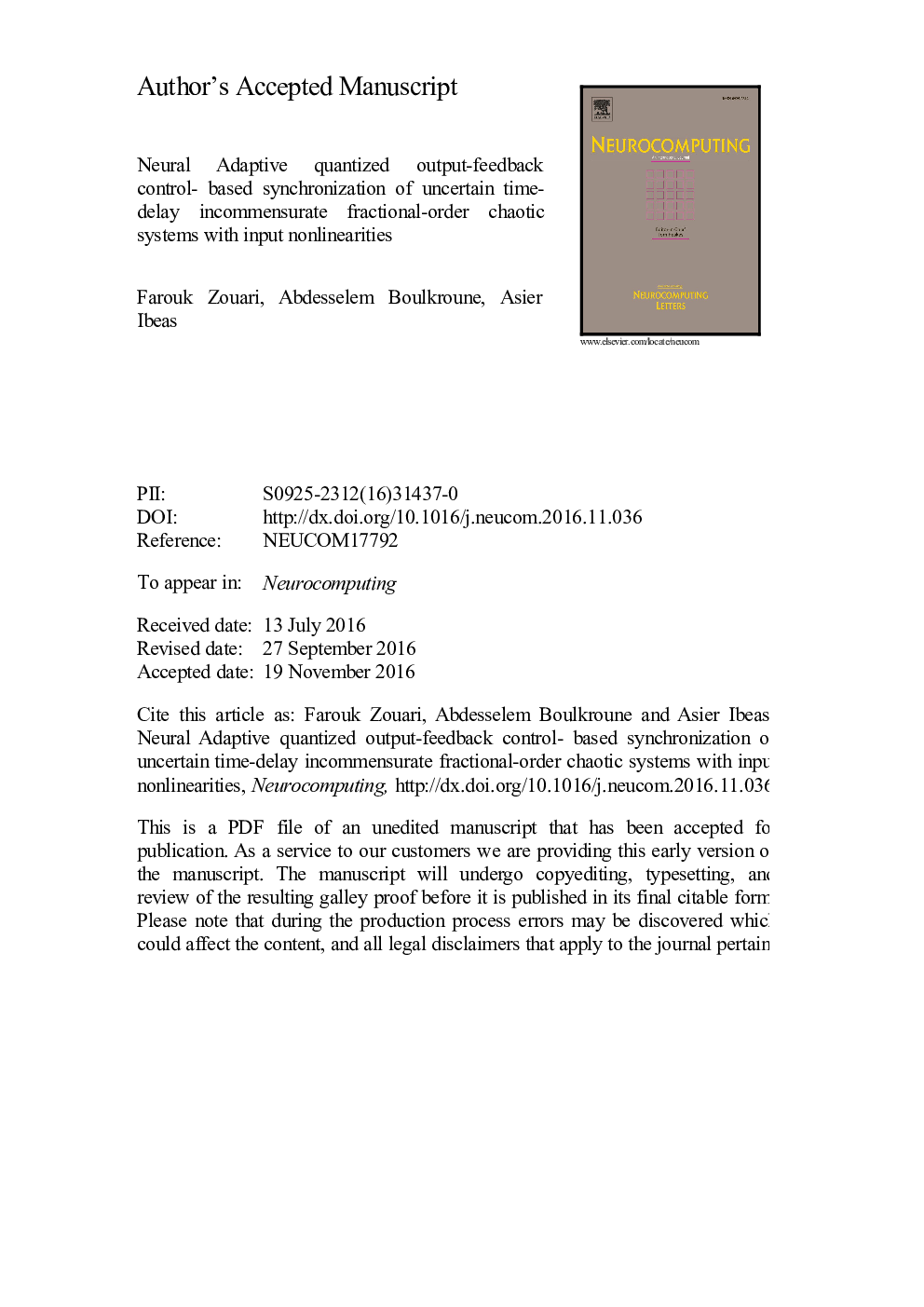| کد مقاله | کد نشریه | سال انتشار | مقاله انگلیسی | نسخه تمام متن |
|---|---|---|---|---|
| 4947764 | 1439590 | 2017 | 72 صفحه PDF | دانلود رایگان |
عنوان انگلیسی مقاله ISI
Neural adaptive quantized output-feedback control-based synchronization of uncertain time-delay incommensurate fractional-order chaotic systems with input nonlinearities
ترجمه فارسی عنوان
هماهنگ سازی مبتنی بر کنترل بازخورد خروجی-بازخورد عددی ضرایب هماهنگ سازی غیرقابل دقیق زمان تاخیری سیستم های بی نظیر غیرمسوولانه ی تقریبی با ناهمخوانی ورودی
دانلود مقاله + سفارش ترجمه
دانلود مقاله ISI انگلیسی
رایگان برای ایرانیان
موضوعات مرتبط
مهندسی و علوم پایه
مهندسی کامپیوتر
هوش مصنوعی
چکیده انگلیسی
This research is concerned with the problem of generalized function projective synchronization of nonlinear uncertain time-delay incommensurate fractional-order chaotic systems with input nonlinearities. The considered problem is challenging owing to the presence of unmeasured master-slave system states, external dynamical disturbances, unknown nonlinear system functions, unknown time-varying delays, quantized outputs, unknown control directions unknown actuator nonlinearities (backlash-like hysteresis, dead-zone and asymmetric saturation actuators) and distinct fractional-orders. Under some mild assumptions and using Caputo's definitions for fractional-order integrals and derivatives, the design procedure of the proposed neural adaptive controller consists of a number of steps to solve the generalized function projective synchronization problem. First, smooth functions and the mean value theorem are utilized to overcome the difficulties from actuator nonlinearities and distributed time-varying delays, respectively. Then, a simple linear observer is established to estimate the unknown synchronization error variables. In addition, a Nussbaum function is incorporated to cope with the unknown control direction and a neural network is adopted to tackle the unknown nonlinear functions. The combination of the frequency distributed model, the Razumikhin Lemma, the neural network parameterization, the Lyapunov method and the Barbalat's lemma is employed to perform the stability proof of the closed-loop system and to derive the adaption laws. The major advantages of this research are that: (1) the Strictly Positive Real (SPR) condition on the estimation error dynamics is not required, (2) the considered class of master-slave systems is relatively large, (3) all signals in the resulting closed-loop systems are semi-globally uniformly ultimately bounded and the synchronization errors semi-globally converge to zero. Finally, numerical examples are presented to illustrate the performance of the proposed synchronization scheme.
ناشر
Database: Elsevier - ScienceDirect (ساینس دایرکت)
Journal: Neurocomputing - Volume 237, 10 May 2017, Pages 200-225
Journal: Neurocomputing - Volume 237, 10 May 2017, Pages 200-225
نویسندگان
Farouk Zouari, Abdesselem Boulkroune, Asier Ibeas,
